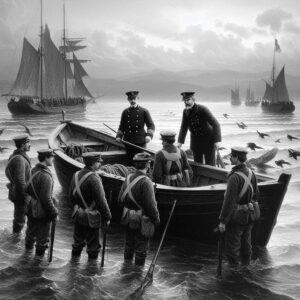Press gangs affected Fishermen and Gypsies in 1815 Scotland
Please note that I use the word Gypsy in this article to acknowledge their assignment as an actual demographic category in the UK. Which unfortunately didn’t happen until 2011. Along with additional changes in 2021.
On the whole, the early 19th century was a tumultuous time in Scotland. It was marked by the end of the Napoleonic Wars and significant social and economic changes. Among the many stories from this period, those related to the lives of fishermen, gypsies, and the dreaded press gangs stand out. In this blog post, we will explore the unique experiences of these groups. With a focus on 1815 Scotland, and how their lives intertwined in the face of adversity.
The Fishermen
To illustrate this, fishing was a vital industry in 19th-century Scotland. Providing sustenance and employment for many coastal communities. Fishermen faced the harsh realities of the sea, braving dangerous conditions to bring in their catch.
The fisherfolk were known for their resilience and strong sense of community. They relied on each other for support, whether it was mending nets, preparing bait, or sharing the day’s catch. The women played a crucial role in this industry; often working alongside the men and managing the household in their absence.1
The Gypsies
Without a doubt, gypsies is a term that does not capture the diversity of different traditions. Gypsies have a long and complex history in Scotland and the UK. By 1815, they had been present in the country for several centuries, often living on the fringes of society. They were known for their nomadic lifestyle, traveling from place to place in search of work and opportunities2.
Unfortunately, such people faced significant prejudice and discrimination, often being viewed with suspicion and mistrust by the settled population. Despite these challenges, they maintained a rich cultural heritage, with their own language, traditions, and customs. Their skills in various trades, such as metalworking, horse trading, and fortune-telling, made them valuable members of the communities they interacted with2.
The Press Gangs
The press gangs were a notorious aspect of life in early 19th-century Scotland. These groups, sanctioned by the Royal Navy, were tasked with forcibly recruiting men into naval service. Although, some voluntarily entered paid service also. The practice of impressment, as it was known, was a legal but highly unpopular method of bolstering the navy’s ranks during times of war3.
Press gangs would often target coastal communities. Basically, there they could find experienced seamen and fishermen. They used various tactics to capture their victims. From outright kidnapping to more subtle methods like plying men with alcohol, and tricking them into “volunteering” for service. The fear of being pressed into service was a constant threat for many men, leading some to go into hiding or flee their homes3.
The Intersection of Fishermen, Gypsies, and Press Gangs
Fishermen, with their valuable seafaring skills, were prime targets for press gangs. They could be abducted whilst at sea. The constant threat of impressment added to the already challenging lives of these coastal communities3.
Whereas Gypsies, with their nomadic lifestyle, were sometimes able to evade the press gangs more effectively than the settled population. However, they too faced the risk of being forcibly recruited. Especially, if they were found in coastal areas. The shared experience of living under the threat of impressment created a sense of solidarity between these two marginalized groups2.
A fascinating glimpse into history
In summary, the stories of fishermen, gypsies, and press gangs in 1815 Scotland offer a fascinating glimpse into a turbulent period of history. These groups, had their own unique challenges and experiences. They navigated a world marked by uncertainty and change. Their resilience and adaptability in the face of adversity continue to inspire and captivate us today.
1: VisitScotland 2: Claire Gebben 3: Historic UK

0 Comments